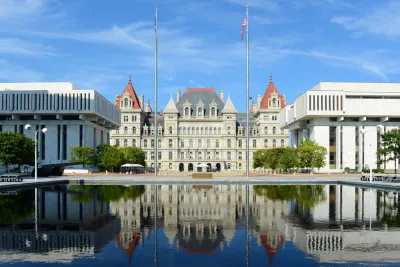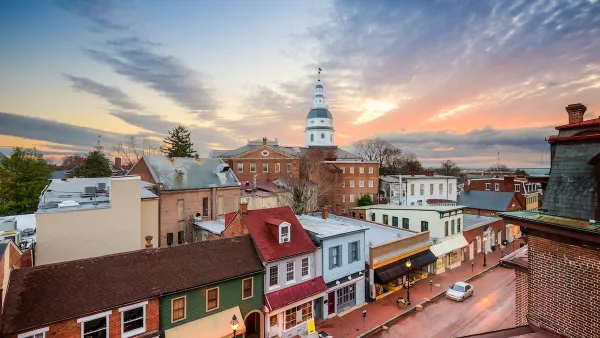State governments like to limit local taxing authority but not local zoning—maybe they should do the exact opposite.

When I was listening to a speech about street design, I heard repeated references to the state government—about what "Albany" (the state of New York) will allow New York City to do and what it won't allow the city to do. This incident made me wonder: Where should we draw the lines between state and local authority?
The dominant American view seems to be that the local governments have almost-total control over zoning, but very little control over anything else. In particular, statewide politicians like to gain political support by claiming credit for cutting local property taxes, or by preventing local governments from instituting new taxes.
It seems to me, however, that this distribution of state and local responsibilities is absolutely backwards. Why? I begin with two assumptions:
- Normally, a city’s residents and politicians know how to run their own affairs to a greater extent than do nonresident politicians (such as state legislators from other cities or from rural areas).
- An exception to this principle exists when a) a city’s actions significantly harm nearby towns (e.g. by allowing pollution that crosses municipal boundaries) or (b) there is a "tragedy of the commons" problem (where a certain policy is good for each individual municipality, and thus widely adopted, but is harmful to the region as a whole).
So how do these assumptions apply to specific policies? First, it seems to me that local governments should have nearly absolute power to set their own tax rates and decide their own mix of rates, with no state interference. For example, there is no reason why the governor of New Jersey should have more power over Piscataway's tax rates than the voters of Piscataway. The governor might have visited Piscataway once or twice while running for office, but otherwise has no special expertise in local affairs. Similarly, nearby towns are not harmed if Piscataway's tax rates are too high: if anything, they benefit if Piscataway overtaxes itself, as people and businesses move to those towns. Similarly, there is no "tragedy of the commons" issue: it is not particularly rational for an individual town or suburb to overtax itself. Ideally, state constitutions would give local governments plenary power over taxes (with the possible exception of taxes that affect nonresidents, such as hotel taxes).
On the other hand, the case for local control of zoning is much weaker. The "local expertise" argument (assumption 1 above) may still apply to zoning. However, restrictive zoning clearly creates a "tragedy of the commons" problem. It is rational for each city's homeowners to have highly restrictive zoning, to limit the housing supply and thus increase property prices. In cities with rent control, it is also rational for renters to prefer restrictive zoning, since they are unlikely to move and thus do not benefit from new construction.* For the same reasons, it is rational for neighborhoods within a city to prefer restrictive zoning.
However, restrictive zoning is irrational for a city or region as a whole: it leads to stunted housing supply, thus increasing housing prices, thus keeping out poor and middle-class workers and new residents generally. In fact, recent economic scholarship suggests that zoning even harms the national economy. Because restrictive zoning is rational for each city or neighborhood but irrational for the region as a whole, state governments should rigorously police local zoning.
In sum, state governments are active where they should be passive, and passive where they should be active.
*Indeed, it could be argued that even ordinary renters benefit from restrictive zoning in certain circumstances: where new housing is more attractive than the existing housing stock, thus making the neighborhood more attractive and raising rents for everyone. This claim too involves a tragedy of the commons: it is more likely that new housing will make one neighborhood especially attractive if it is confined to that area, while new housing in every neighborhood is not likely to make one area attractive relative to others, which in turn means that new housing is more likely to bring down rents everywhere.

Analysis: Cybertruck Fatality Rate Far Exceeds That of Ford Pinto
The Tesla Cybertruck was recalled seven times last year.

National Parks Layoffs Will Cause Communities to Lose Billions
Thousands of essential park workers were laid off this week, just before the busy spring break season.

Retro-silient?: America’s First “Eco-burb,” The Woodlands Turns 50
A master-planned community north of Houston offers lessons on green infrastructure and resilient design, but falls short of its founder’s lofty affordability and walkability goals.

Test News Post 1
This is a summary

Analysis: Cybertruck Fatality Rate Far Exceeds That of Ford Pinto
The Tesla Cybertruck was recalled seven times last year.

Test News Headline 46
Test for the image on the front page.
Urban Design for Planners 1: Software Tools
This six-course series explores essential urban design concepts using open source software and equips planners with the tools they need to participate fully in the urban design process.
Planning for Universal Design
Learn the tools for implementing Universal Design in planning regulations.
EMC Planning Group, Inc.
Planetizen
Planetizen
Mpact (formerly Rail~Volution)
Great Falls Development Authority, Inc.
HUDs Office of Policy Development and Research
NYU Wagner Graduate School of Public Service





























